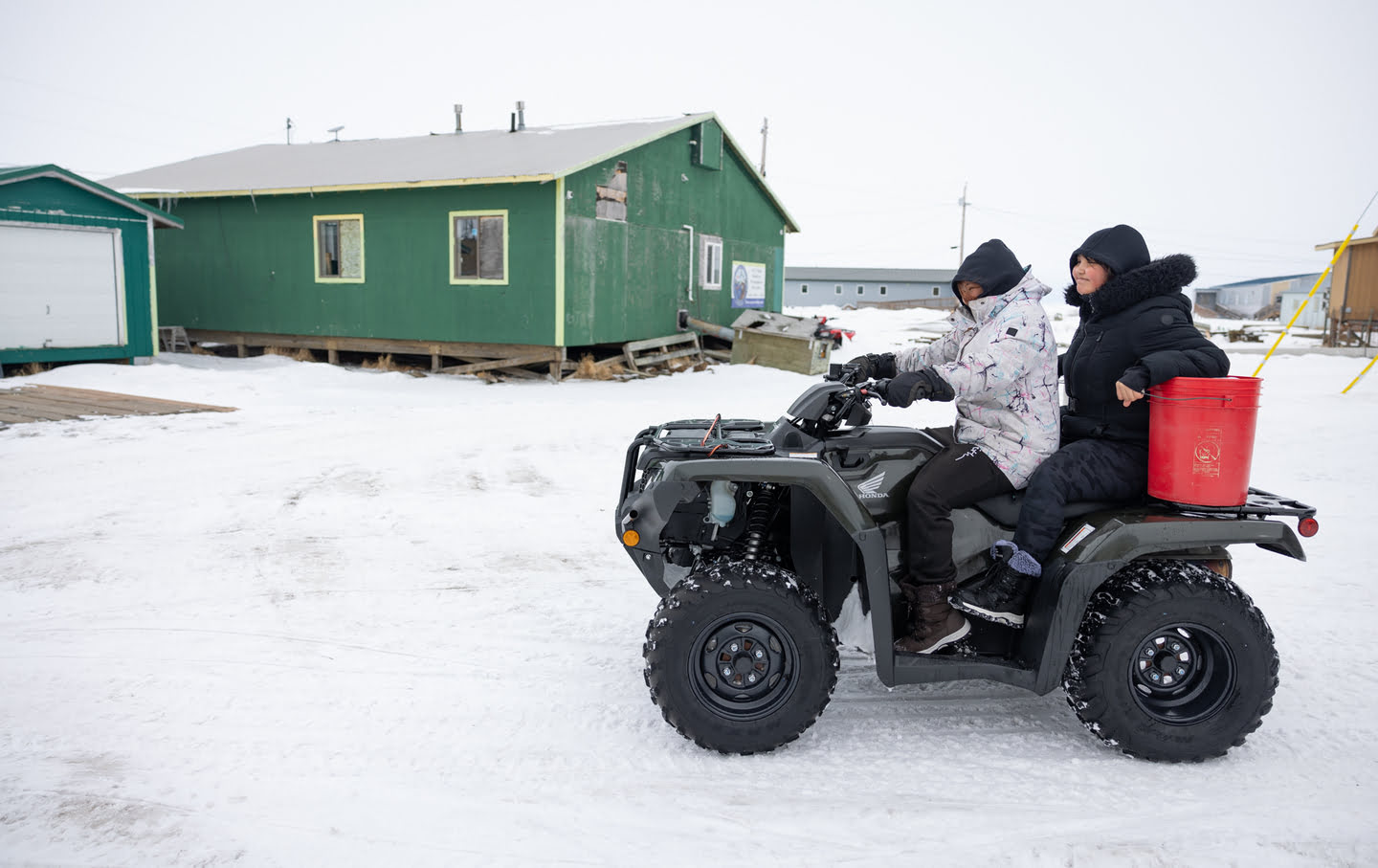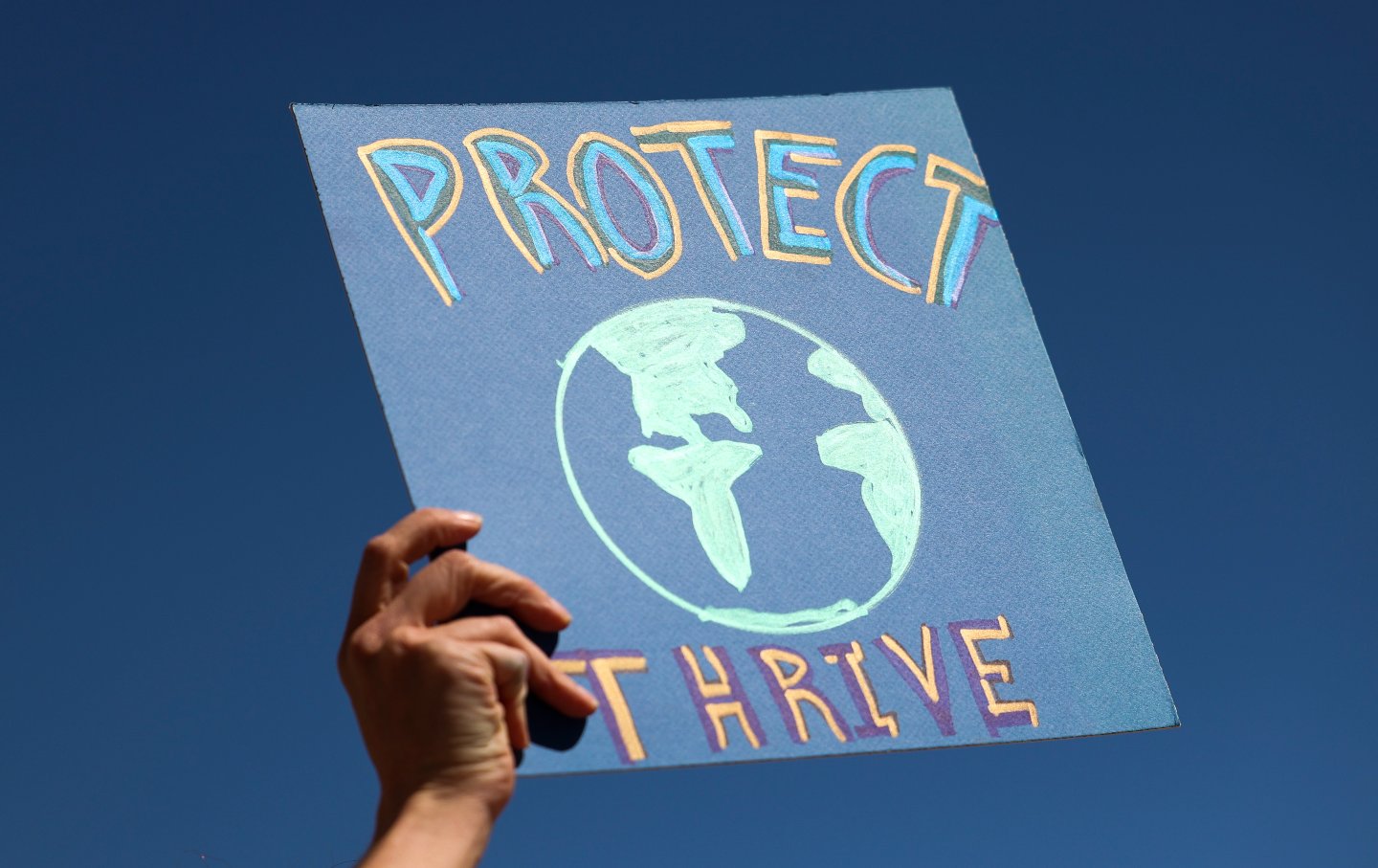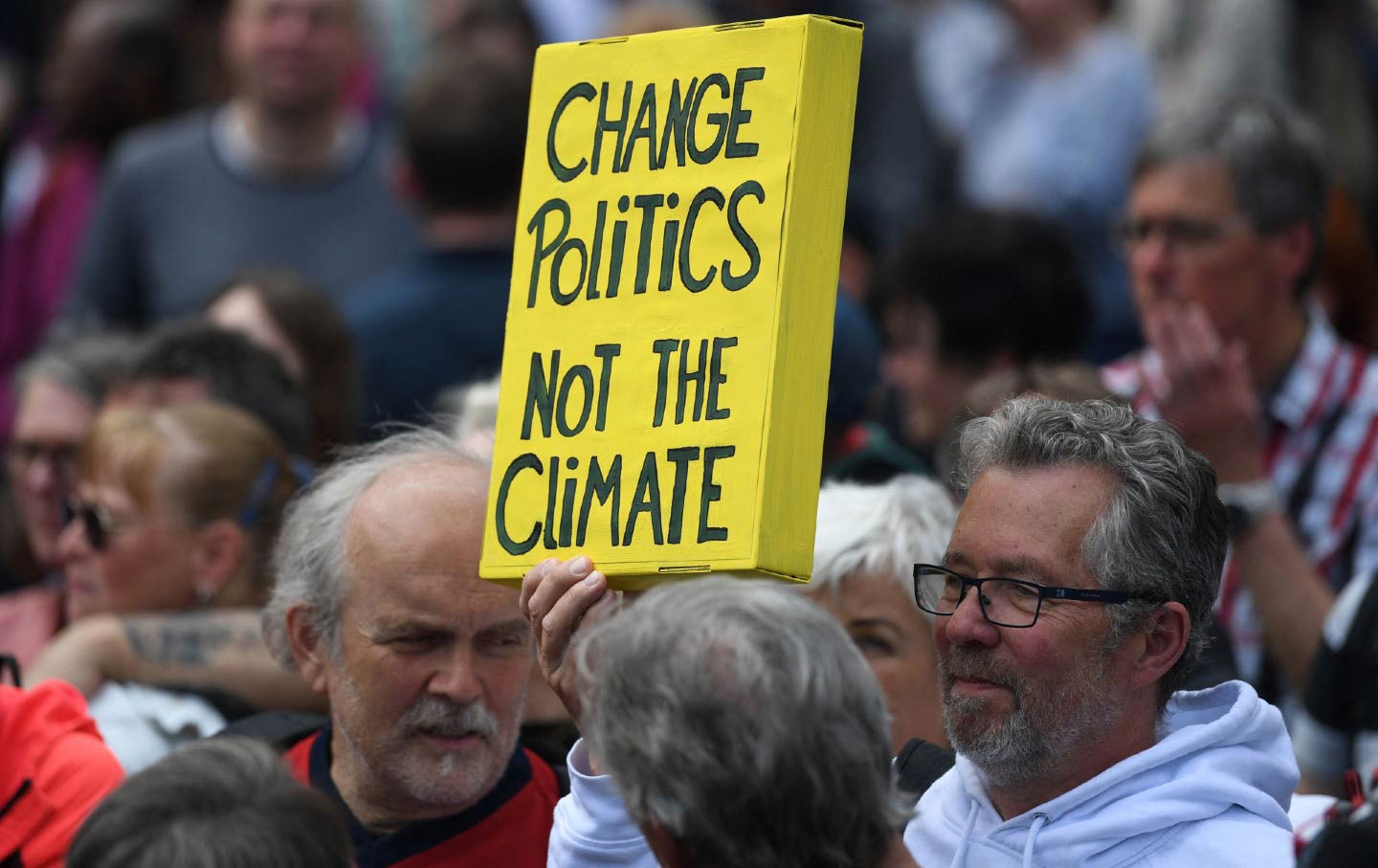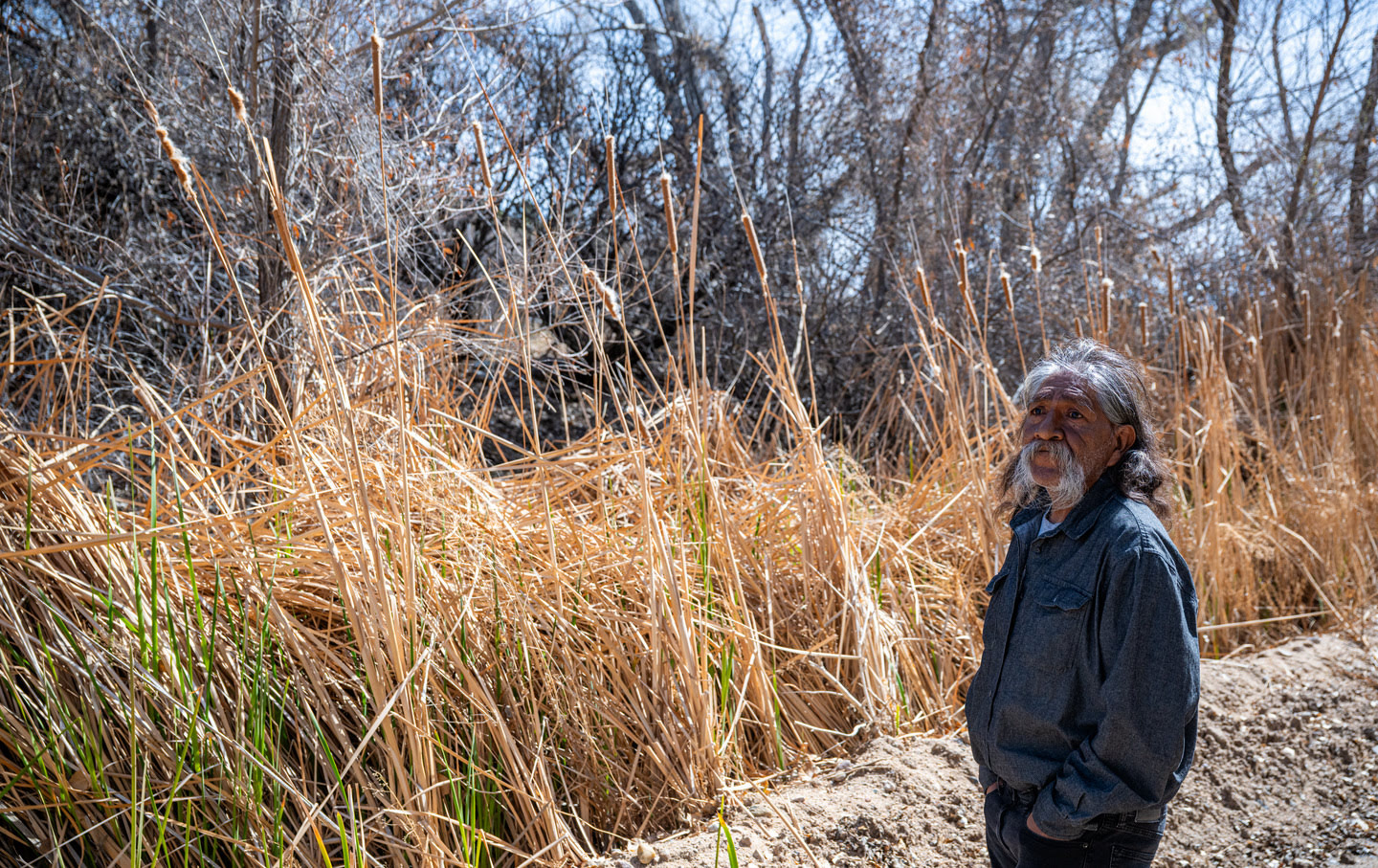The People in Charge Won’t Save Us From Climate Catastrophe. We’ll Need to Do It Ourselves.
Grassroots efforts in places like North Carolina show what we can—and increasingly must—do in a world plagued by climate disasters.
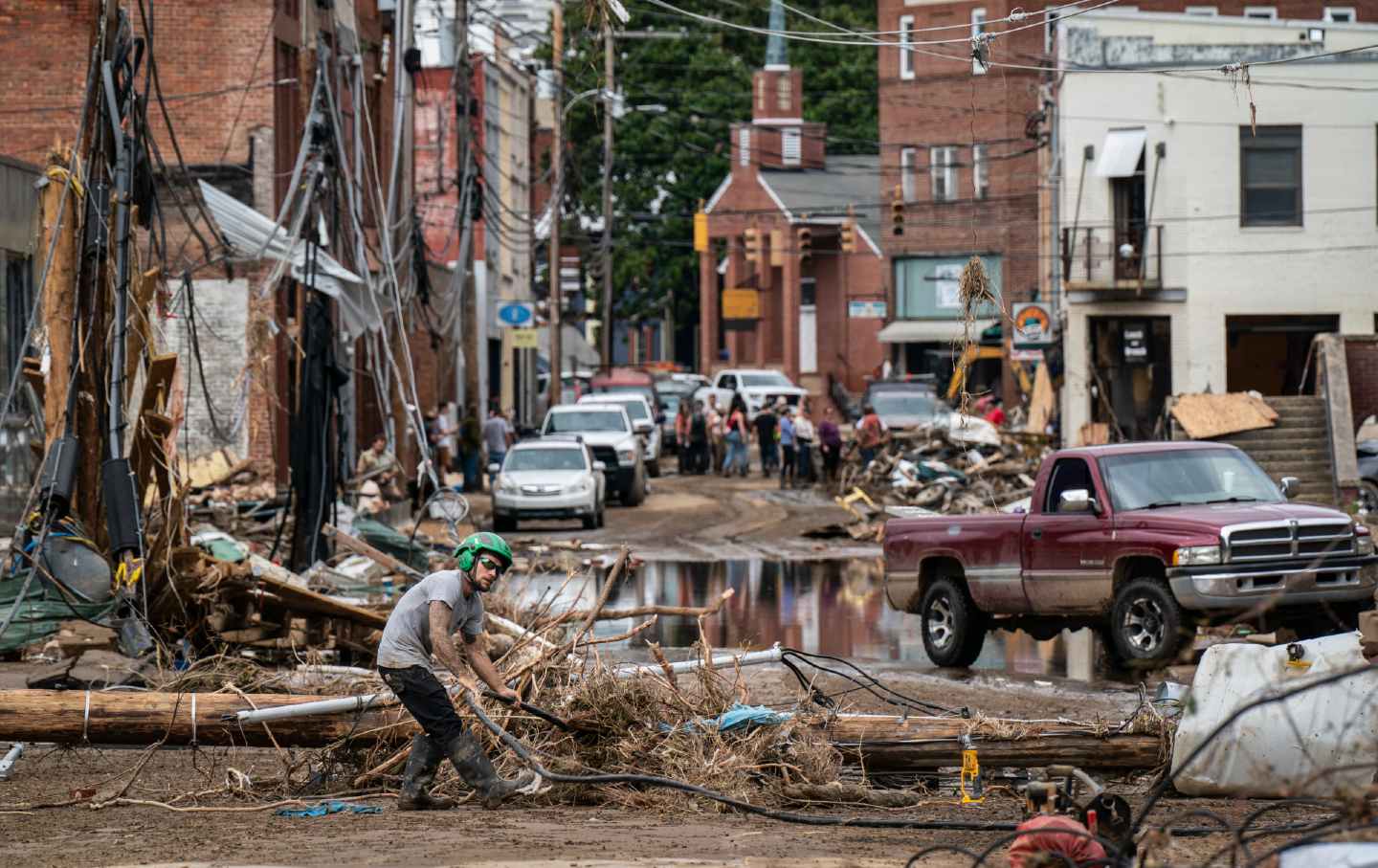
Workers, community members, and business owners clean up debris in the aftermath of Hurricane Helene in Marshall, North Carolina, on September 30, 2024.
(Jabin Botsford / The Washington Post via Getty Images)
On September 28, the day after Hurricane Helene hit North Carolina, when parts of Asheville were underwater, cell phone and Internet service were down, and utilities nonexistent, people spontaneously gathered at Firestorm Books.
The dozens of people who showed up at the worker-owned radical bookstore in West Asheville quickly coalesced into groups to address different areas of need, with medical care and access to water emerging as major concerns. With many clinics and pharmacies closed, health problems that wouldn’t necessarily be life-threatening under normal circumstances—like an asthma attack—risked spiraling into emergencies. The lack of running water heightened the public health threat, and residents knew from previous outages that it might be days before service was restored. In fact, it would be nearly two months.
It was unclear at the time what the state and local governments planned to do. At Firestorm, a group of medical workers hatched a plan for setting up a free clinic located at the Double Crown, a beloved neighborhood dive bar known for its rowdy honky tonk and gospel shows. “Because of the space a bar occupies in the community, you know so many people in the area,” Elliot Patterson, a public health graduate student and member of a local street medic collective, said. “You have to do what you can with relationships you already have.”
While the government response and aid from nonprofit groups gradually took shape, residents quickly came together to not only operate a free medical clinic out of a dive bar but also set up more than 100 water stations throughout the city, conduct thousands of wellness checks, create complex supply distribution systems connecting the city with hard-hit rural areas, and even form a “flush brigade” that, day after day, bucket-flushed the toilets of people who weren’t able to lift a heavy pail of water.
Now it’s been more than four months since Helene struck Western North Carolina, and mutual aid remains a core part of the ongoing recovery. Looking ahead, those who have participated in these efforts say it’s only going to become more crucial to build networks of community care as climate change worsens and the political vision of the far right comes to fruition under Donald Trump’s second term as president. Already, a new disaster of horrific proportions seized Los Angeles, where megafires have incinerated whole neighborhoods, displaced more than 100,000 residents, and engulfed the area in toxic smoke
“We’re not the first community to face a climate disaster, or a political disaster, and we will not be the last,” Grace Barron, one of the water organizers, said. “Let’s have these support systems in place so we know we’ve got each other through whatever comes next.”
When they arrived at the Double Crown, Patterson and the other medics discovered that the bar’s workers and patrons had already started to distribute supplies. They had set up a tank of water sourced from a natural spring at a bartender’s home, and right away crowds began flocking to it. “I think that’s when it all really hit us,” Violet Sotomayor, another Double Crown bartender, said. She recalled a pregnant woman who showed up with her children looking for potable water. “They didn’t have containers. She’s pregnant, like, going to have a baby within that week, and we’re filling her water into a Pringles can.”
Sotomayor, Patterson, and others teamed up to turn the bar into DC Distro, a combination free store, makeshift clinic, and hub for sourcing and delivering supplies throughout the city and surrounding counties. DC Distro physicians treated patients suffering from all kinds of conditions—allergic reactions, ear infections, high blood pressure—while working with a local pharmacy to devise a plan for filling prescriptions without functioning credit card machines or contact with insurance companies. Within a few days, DC Distro had established a regular schedule of volunteer medical providers and translators, and systems for managing a growing inventory of donated food and supplies.
Information about where to take supplies traveled by word of mouth. A lot came from volunteer wellness checks coordinated by the Buncombe County Register of Deeds, the office responsible for handling birth, death, and marriage certificates. Deputy Registrar Emily Peele said the wellness checks weren’t an official government effort, but rather a solution she and her colleagues formed on the fly, in the absence of a top-down plan. “We had endless amounts of people who wanted to take care of each other,” she said. “It didn’t feel like [local government leaders] were willing to use that people power.”
Peele’s office, in a part of downtown Asheville that never lost power, still had electricity and the Internet, so they advertised an e-mail address that people outside of hurricane-impacted areas could contact if they were worried about loved ones. Volunteers would go to their homes, sometimes trekking on foot through landslide debris, to find out if the people in question were alive, deliver a care package, and see if they needed additional help. Ultimately more than 2,600 volunteers checked on nearly 16,000 households in the span of a week.
One of the biggest needs that volunteers identified was toilet flushing. Many Asheville residents were filling buckets with creek water to flush their toilets, but people who were elderly or disabled often had no choice but to let waste pile up and hope water service would soon be restored. The wellness check volunteers started a “flush brigade” to haul water into their homes and flush the toilets. Some formed an organization called Flush AVL to focus exclusively on this task, branching out to also serve rural areas.
As it became clear how much damage the hurricane wrought on the city’s water system, which also serves surrounding Buncombe County, residents realized it would be weeks, not days, before service was restored to about 100,000 people who lacked running water. An ad hoc group that grew from the meeting at Firestorm Books had been distributing potable well water, so they developed a plan to ramp up their work and find a long-term solution under the name BeWell Asheville.
Popular
“swipe left below to view more authors”Swipe →On a chilly November morning last year, Emma Perlstein and CJ Smith parked a flatbed truck hauling 550 gallons of water in the cul de sac of a senior living facility. They snaked a hose from a large water storage tank on the truck to an identical tank on a wooden platform stationed near the building’s entrance. Perlstein cranked a gas-powered pump; as it roared to life, potable water flowed from their tank to the one that residents had relied upon since late September.
The water station was one of more than 100 set up and maintained by BeWell that helped Asheville residents through several months of uncertainty. By the end of October, water was restored to most homes and businesses, but it wasn’t safe to drink. In mid-November—53 days after pipes ran dry—city leaders lifted a “boil water” advisory, but many residents remained concerned about the safety of the water, especially the potential for lead contamination.
“We didn’t start out knowing about water. It was all learning,” Smith said. He and Perlstein, like many BeWell volunteers, are out-of-work food service employees. Asheville’s economy relies heavily on tourism, and about a third of all workers are employed by the hospitality industry, which ground to a halt after the hurricane.
Figuring things out as they went, the group identified residential wells that could be powered with generators, convened people with carpentry and plumbing skills to construct water stations; obtained IBCs (storage tanks that can hold several hundred gallons of liquid); and enlisted people with pickup trucks—“water cowboys,” according to Smith— to haul potable well water to distribution points in neighborhoods throughout the city. Eventually, BeWell was able to source water from a tanker truck provided by World Central Kitchen, and they got their own flatbed truck that could haul multiple IBCs at a time. They set up headquarters at a defunct poinsettia nursery the owner offered for free. They even created an app so people could easily request IBC refills.
By contrast, Asheville’s city government initially stationed a water tanker at a downtown park, issuing instructions for residents to bring their own containers to fill. They soon added a few other locations where people could receive bottled water, gallon jugs, and non-potable water for flushing, as well as MREs. Eventually there were eight city-run water distribution sites. Buncombe County also distributed water and supplies from several locations, and set up five Community Care Stations where residents could access showers, laundry facilities, and meals. To reach vulnerable populations, the city delivered cases of water to 48 addresses that included public housing apartments, sober living facilities, and homeless shelters. But some found the response lacking; a local news outlet reported that the Asheville Housing Authority didn’t provide aid to residents until about a week after the storm, and posted flyers informing them that rent would still be due.
Ultimately, demand for water outpaced what local governments offered. BeWell filled the gap and focused on setting up IBCs in trailer parks, public housing, and low-income neighborhoods, so residents wouldn’t need to wait for deliveries or require transportation to get water. Barron, the water organizer from the initial meeting at Firestorm Books, became a core member of BeWell; she estimates that, at the height of their operations, the group was distributing up to 40,000 gallons of water per day. “The community deserves credit for the response to this storm,” she said.
Rural parts of Western North Carolina suffered some of the worst storm damage, and community members have driven recovery efforts in those areas too. In Marshall, a small town 20 miles north of Asheville, the quaint main street along the French Broad River was reduced to rubble. “The only help that was available the first few days was what people could pull together,” said Matt Wallace, a vegetable farmer and member of a mutual aid group called Rural Organizing And Resilience, or ROAR.
The group formed in 2017 to counter white nationalist recruitment in southern Appalachia. They’ve worked on racial justice campaigns while organizing mutual aid to meet local needs, like a free firewood program every winter. After Helene, they led wellness checks and assembled chainsaw crews to help people clear downed trees, delivered spring water to groups like BeWell in Asheville, and set up a mutual aid hub where people could get free food, clothes, camping gear, and other supplies. “We have people that come here regularly to get supplies that also dropped off like, six dozen eggs from their chickens to give to people,” he said.
When one of ROAR’s social media posts went viral, they were suddenly inundated with cash donations that they immediately redistributed. Wallace estimated they gave away upwards of $250,000. “That’s probably the hugest need right now,” he said. As people fall behind on rent and utility bills, “there’s just not many groups that are offering money to people, especially without paperwork.”
ROAR has directed a substantial amount of the funds toward immigrant communities that face barriers to receiving aid. Yancey County, near Marshall, was devastated by the storm, but undocumented people and families with mixed legal status have been afraid to seek government support. They’ve also faced discrimination. A Latina resident whose parents are immigrants told The Nation that she routinely hears white people make racist comments while she’s standing in line for food and supplies, and that a local nonprofit requires identification, turning people away if they have a foreign ID. The woman, who didn’t want to give her name for fear of being targeted, now sources supplies from ROAR to distribute among Latino families in Yancey, and she’s working on starting a mutual aid hub in her community.
As the post-hurricane recovery progresses, mutual aid efforts are evolving. Asheville’s government declared tap water drinkable in November, and BeWell has been gradually decommissioning their water stations as demand declines. But some residents remain concerned about the potential for lead contamination after the water in seven Asheville elementary schools tested positive. The city is offering free at-home test kits and has gotten more than 8,000 requests. Less than a quarter have been processed and, so far, the results showed that about 2 percent detected lead.
Now, BeWell is focused on replicating its model. “How do we provide access to knowledge and tools for the next situation?” Smith said. “One of our ideas is to have starter kits ready, so if there’s a regional disaster that has a water crisis, we can go down there and have IBC stands, plumbing, everything ready.”
The Double Crown is back to serving drinks and staging shows, but those who ran the DC Distro continue mutual aid in other forms. “I think it woke up a lot of people,” Sotomayor said. “Other bartenders and bar patrons were like, ‘How do we keep helping?’”
Everyone who spoke with The Nation emphasized a similar view: that mutual aid sparked by a crisis can lead to ongoing organizing and broader societal change. Many in Asheville were involved with mutual aid during the Covid-19 pandemic, the Occupy movement, and even Hurricane Katrina. In Los Angeles, mutual aid networks that formed in response to Covid and the housing crisis are ramping up to address the fires. Across the country, many mutual aid groups established during disasters have continued operating in order to meet community needs that are neglected (or created) by prevailing political and economic systems—from housing, to healthcare, and beyond. “Another world is possible,” Barron said. “We’re building it right now.”
Hold the powerful to account by supporting The Nation
The chaos and cruelty of the Trump administration reaches new lows each week.
Trump’s catastrophic “Liberation Day” has wreaked havoc on the world economy and set up yet another constitutional crisis at home. Plainclothes officers continue to abduct university students off the streets. So-called “enemy aliens” are flown abroad to a mega prison against the orders of the courts. And Signalgate promises to be the first of many incompetence scandals that expose the brutal violence at the core of the American empire.
At a time when elite universities, powerful law firms, and influential media outlets are capitulating to Trump’s intimidation, The Nation is more determined than ever before to hold the powerful to account.
In just the last month, we’ve published reporting on how Trump outsources his mass deportation agenda to other countries, exposed the administration’s appeal to obscure laws to carry out its repressive agenda, and amplified the voices of brave student activists targeted by universities.
We also continue to tell the stories of those who fight back against Trump and Musk, whether on the streets in growing protest movements, in town halls across the country, or in critical state elections—like Wisconsin’s recent state Supreme Court race—that provide a model for resisting Trumpism and prove that Musk can’t buy our democracy.
This is the journalism that matters in 2025. But we can’t do this without you. As a reader-supported publication, we rely on the support of generous donors. Please, help make our essential independent journalism possible with a donation today.
In solidarity,
The Editors
The Nation

